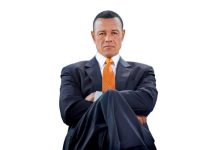
After a day of taking fire from members for inviting Donald Trump to their annual convention — and reportedly flubbing the invite for Vice President Kamala Harris — the president of a Black journalists’ organization insisted Wednesday that his team and Harris’s both wanted her to appear but the vice president’s rigid campaign schedule kept her away.
In a statement, Ken Lemon, president of the National Association of Black Journalists, said that NABJ leadership and Harris’s team had been negotiating for months but could not resolve the scheduling conflict for even a virtual appearance in Chicago, the site of this year’s convention.
“NABJ has been in talks with both the Democratic and Republican parties since January,” according to the statement. “NABJ was in contact with Vice President Kamala Harris’ team for an in- person panel before President Joe Biden dropped out of the race in July.”
But NABJ member April Ryan, a longtime White House correspondent who covered the Trump administration, wrote on X that NABJ leadership rejected the Harris campaign’s counter-offer of a virtual town hall in lieu of an in-person meeting.
“SCOOP: according to those (many) familiar with this situation, Tuesday am both Ken Lemon President of NABJ and Drew Berry Executive Director of the NABJ told Harris folks she “needed” to be in Chicago in person for the convention,” Ryan wrote. “The NABJ shut down the conversation for a virtual town hall. Only after reports of what happened were posted did the NABJ leadership feverishly begin to ask the @VP to now consider a virtual town hall.”
Ryan’s post seems to confirm what Roland Martin, a veteran journalist and TV host, reported on Wednesday; that NABJ leadership botched the invitation to Harris and misrepresented the situation to rank-and-file membership.
Those reports, coupled with Lemons’ statement, added fuel to a backlash against NABJ leadership, triggered when it announced that Trump would attend the convention but Harris — the first Black woman to serve as vice president, and the first with a realistic shot at the presidency — would not. The situation made national headlines, divided the rank-and-file membership, and led to the public resignation of an influential convention official.
“I have decided to step down as co- chair from this year’s #NABJ24 convention in Chicago,” Karen Attiah, a columnist for The Washington Post, wrote in a post. “While my decision was influenced by a variety of factors, I was not involved or consulted with in any way with the decision to platform Trump in such a format.”
She was referring to NABJ leadership’s decision to have Trump field questions from a select panel of three members who are experienced political journalists. But members criticized the decision to include Harris Faulkner, a prominent Fox News host who is friendly with the former president.
“To the journalists interviewing Trump, I wish them the best of luck,” Attiah wrote in her post. “For everyone else, I’m looking forward to meeting and reconnecting with all of you in the Windy City.”
Almost immediately, several outspoken NABJ members took to X, slamming the decision to give Trump — a politician with a long record of bigotry, mendacity, and hostility towards the Black community — a high-profile platform with Black journalists. They pointed out that the Republican presidential nominee publicly berated three prominent NABJ members, unabashedly embraced white supremacists, and turned down multiple invitations to attend the convention.
In his first attempt at damage control, Lemon argued that inviting Trump was standard NABJ procedure: since it was formed in the mid-1970s, the organization has invited politicians from both parties to appear, and has always invited presidential contenders to talk about the issues.
Former presidents Bill Clinton and Barack Obama, as well as former Secretary of State Hillary Clinton, all answered hard-hitting questions from NABJ members at the convention either in person or virtually. While the organization has invited GOP contenders, Trump is one of just a handful to accept.
But Trump’s decision to show up this year is new: Martin, host of Roland Martin Unfiltered, wrote on X Tuesday that the former president and current Republican presidential nominee “REFUSED to speak to NABJ in 2016, 2017, 2018, 2019 and 2020.”
Lemon tried to answer with his own statement on X. He declared that, regardless of his record with NABJ, Trump could become the next president. Therefore, Lemon wrote, Trump should face hard-hitting questions from Black reporters on issues important to the community.
But Ryan and others countered that the Q-and-A format Trump agreed to with NABJ’s hand-picked panel — Faulkner, Rachel Scott, who covers Congress for ABC News, and Semafor political correspondent Kadia Goba — shields the former president from even tougher, more adversarial questions that an entire roomful of skeptical Black journalists likely would come up with.
In his Wednesday statement, Lemon announced that Politifact, a political watchdog, agreed to fact-check Trump in real-time during the discussion. But that wasn’t enough to satisfy skeptics on X.
“When I accepted my @NABJ Journalist of Distinction Award in 2022, I said that we have to resist our training which says that the truth always has two sides,” NABJ member Imara Jones wrote in a post Wednesday. “Platforming Donald Trump at a professional event today doesn’t show even-handedness. It shows how democracies die.”
“NABJ is not a media outlet, it’s a professional assoc. w/ a mandate to protect members interests,” wrote Gisele Phillips. “DT’s agenda is contrary to interests of free press, Black folks, LGBTQ, & women all of whom make up NABJ. Journalists can interview candidates on their jobs, not in our safe spaces.”















